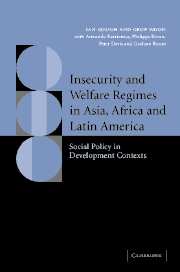 Insecurity and Welfare Regimes in Asia, Africa and Latin America
Insecurity and Welfare Regimes in Asia, Africa and Latin America Book contents
- Frontmatter
- Contents
- List of maps
- List of figures
- List of tables
- List of authors
- Acknowledgements
- List of abbreviations
- Glossary
- Introduction
- Part I Understanding insecurity and welfare regimes in the South: an analytical framework
- Part II Regional regimes
- 4 Latin America : towards a liberal-informal welfare regime
- 5 East Asia : the limits of productivist regimes
- 6 The dynamics of Africa's in/security regimes
- Part III Regimes in global context
- Conclusion : Rethinking social policy in development contexts
- References
- Index
6 - The dynamics of Africa's in/security regimes
Published online by Cambridge University Press: 04 August 2010
- Frontmatter
- Contents
- List of maps
- List of figures
- List of tables
- List of authors
- Acknowledgements
- List of abbreviations
- Glossary
- Introduction
- Part I Understanding insecurity and welfare regimes in the South: an analytical framework
- Part II Regional regimes
- 4 Latin America : towards a liberal-informal welfare regime
- 5 East Asia : the limits of productivist regimes
- 6 The dynamics of Africa's in/security regimes
- Part III Regimes in global context
- Conclusion : Rethinking social policy in development contexts
- References
- Index
Summary
Introduction
In this chapter I use the in/security model developed in chapter 3 to analyse insecurity and welfare on the continent of Africa. The in/security model has five main components: the structural relationships and dynamics involved in the generation of insecurity; mobilisation outcomes; rectification mix; in/security outcomes; and stratification outcomes. It can be used to analyse regimes in long-term equilibrium, regimes in short-term equilibrium (‘regime episodes’, which can often only be identified retrospectively) and regimes in transition (often involved in ‘contentious episodes’ (McAdam et al. 2001)). As discussed in chapter 3, the model potentially allows for five ‘spaces of comparison’ across the five components, and a thorough analysis would make the comparison across all five spaces. However, in a chapter of this size it is not possible to do such an analysis covering all fifty-three African countries involved in processes of post-colonial transition. Furthermore, given the problems with data on welfare mix and welfare outcomes (which are discussed below), quantitative comparisons across these two spaces, of the kind made in the Latin America and East Asia chapters, would be difficult. In any case, I would argue that, in current African conditions, comparisons across the other three spaces lead to more interesting and policy-relevant conclusions. As a result the structure of this chapter differs from that of chapters 4 and 5.
Tilly has suggested that understanding of ‘big structures’ and ‘large processes’ can be generated by a number of different approaches to comparison.
- Type
- Chapter
- Information
- Insecurity and Welfare Regimes in Asia, Africa and Latin AmericaSocial Policy in Development Contexts, pp. 202 - 252Publisher: Cambridge University PressPrint publication year: 2004
- 3
- Cited by


